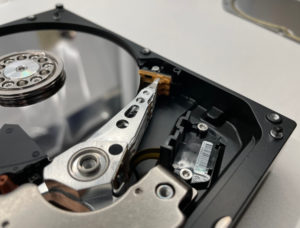Seek error rate is a hard drive performance metric reported through Self-Monitoring, Analysis, and Reporting Technology (SMART) tools.
Hard drives, solid-state drives, and other storage devices use SMART to monitor for issues that may indicate an impending failure. For hard disk drives (HDDs), a high seek error rate is a serious symptom. If your hard drive reports a seek error rate warning, turn off the drive immediately.
Replace the hard drive, if possible. If the HDD has important data, contact a qualified data recovery provider. Do not run data recovery software, as software could make the problem worse.
Datarecovery.com provides risk-free evaluations for hard drives, and our no data, no charge guarantee gives you peace of mind as your case progresses: If we’re unable to recover your important data, you don’t pay for the attempt. Call 1-800-237-4200 or submit a case online to get started.
Below, we’ll discuss seek error rates and provide tips for preventing permanent data loss.
What a “Seek Error Rate Warning” Means
As the name implies, seek error rate refers to the number of seek errors that occur during operation. As a hard drive runs, the actuator assembly moves the heads across the platters, which store your data. Occasionally, the heads may be unable to find the target data; this is a seek error.
If the seek error is high, it might mean that the actuator assembly is failing (a head crash). The heads are moving across the platters, but they’re slightly misaligned, so they’re unable to read and write data to the correct track.
The error could also indicate a high number of bad sectors, overheating, or issues with the drive’s firmware. Each of these scenarios is serious, and if SMART generates a warning, it’s time to replace the failing device.
Steps to Take After a Receiving Hard Drive Seek Error Warning
During normal operation, most hard drives encounter occasional seek errors. However, your computer’s SMART tools are intended to detect impending failures — and if you’re seeing a seek error warning, the chances of HDD failure are high.
We do not recommend defragmenting (or defragging) modern drives with high seek errors, for several reasons. First, defragging puts the drive under severe mechanical stress; if the hard drive is near failure, defragmentation could accelerate that process.

Secondly, if the hard drive’s heads have an alignment issue, defragging the drive will make the problem worse. The HDD will attempt to consolidate data — but if it’s having trouble reading each sector, it will mark potentially readable sectors as “bad,” preventing data access. It may also overwrite good data during write operations.
Likewise, it’s a bad idea to use data recovery software. Software cannot fix a hardware issue, and a seek error warning usually indicates a hardware issue.
If you don’t need the data on the failing HDD, you can simply replace it. Otherwise, follow these steps:
- Keep the hard drive powered off. Don’t attempt to clone the drive or back up your data — if the drive is still accessible, an experienced data recovery provider can clone it safely (and at a minimum rate). If the drive is failing, the process of copying data could cause permanent damage.
- Make a list of any other symptoms that preceded the warning. For example, if the drive made unusual noises (such as clicking sound), that information could be vital during the data recovery evaluation.
- If you’re currently looking at the SMART data, write down the seek error rate. Don’t be alarmed if the number under “raw data” is extremely high — some manufacturers use 48-bit hex output for seek error rates, which expresses the rate as an extremely large number.
- If you’re not looking at the SMART data, don’t boot the hard drive to get the information. Operating the drive creates mechanical stress that can prompt a failure (even if you’re only operating it for a few minutes).
In the case of a head failure, the drive will need to be recovered in a professional laboratory with access to a certified cleanroom.
At Datarecovery.com, we operate full-service laboratories at each of our locations. If you’re dealing with a hard drive failure (or an impending hard drive failure), we’re ready to help.
We provide free evaluations to determine the cause and extent of the HDD failure, which include a risk-free price quote. All services are supported by our no data, no charge guarantee. Call our team at 1-800-237-4200 or submit a case online to get started.




